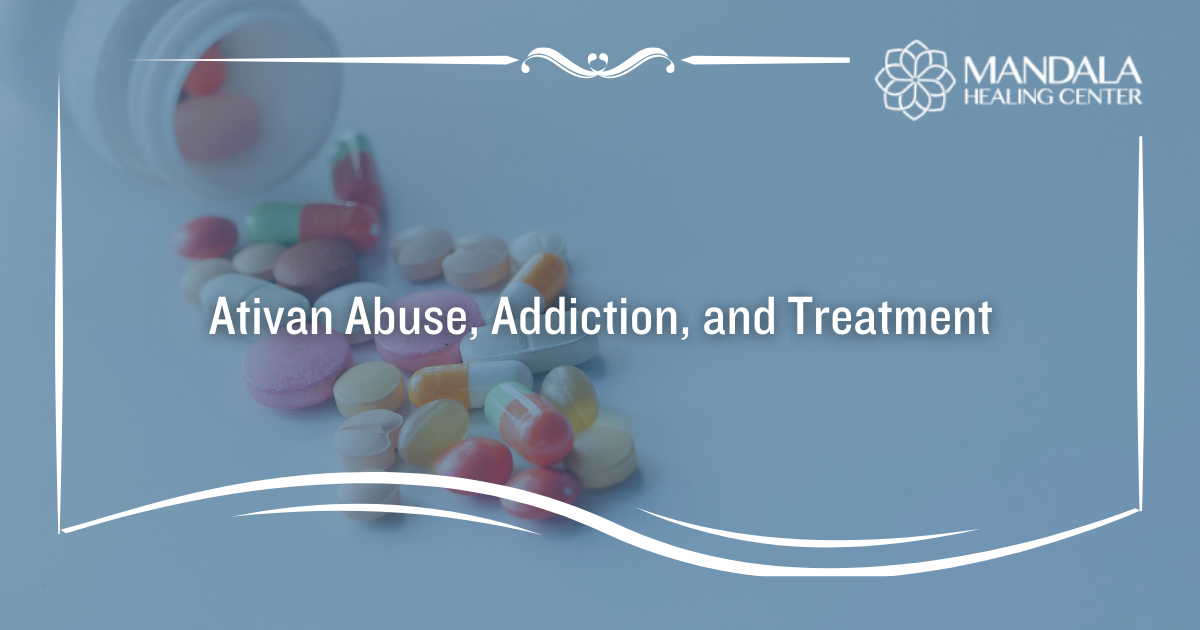Many people believe that prescription drugs are always safe. But many, including Ativan, are addictive. People can develop a dangerous addiction to these drugs, even when taking certain medications under a doctor’s supervision.
If you or someone you love takes Ativan–recreationally or with a prescription–it’s important to understand the risk of addiction and recognize the signs that you need help. Getting treatment for Ativan addiction is the first step toward living the life you choose–instead of the one your addiction chooses for you.
What is Ativan (lorazepam)?
Ativan is the brand name for a medication called lorazepam. Ativan is a prescription benzodiazepine used to treat various medical conditions, including:
- Anxiety
- Seizures
- Bipolar disorder
- Nausea caused by chemotherapy
- Insomnia and other sleep disturbances
- Agitation
- Muscle spasms
- Alcohol withdrawal symptoms
Those taking Ativan may become addicted, even under a doctor’s supervision. Some people take it without a prescription for its sedative and euphoric effects. Those taking it recreationally are more likely to develop Ativan addiction than people using it as prescribed. However, anyone who uses addictive drugs, including Ativan, can develop a dependence on them, even without other risk factors for addiction.
Understanding Ativan Abuse
Ativan is a highly addictive benzodiazepine medication. Recognizing some of the common signs of Ativan abuse may help you identify Ativan abuse and seek appropriate treatment.
Some of the signs of Ativan abuse include:
- Lack of appetite
- Headaches
- Shakiness
- Nausea and vomiting
- Dizziness
- Confusion
- Sweating
- Fatigue
- Losing consciousness or passing out
After a period of heavy or frequent Ativan use, people may develop a dependence or addiction to the medication. Ativan addiction is defined as a loss of control over your substance use and has many behavioral, physical, and emotional symptoms.
Some common signs of addiction are:
- Doctor shopping– having multiple prescriptions for Ativan from several doctors
- Isolating
- Neglecting your responsibilities at home, work, or school
- Hiding or lying about Ativan use
- Taking larger or more frequent doses of Ativan than prescribed
- Legal or financial issues related to Ativan abuse
- Needing to take more of the drug to get the same effects
- Experiencing withdrawal symptoms if you stop taking Ativan
Ativan abuse and addiction can harm a person’s short and long-term health. In the short term, those who abuse Ativan may experience:
- Excessive sedation
- Depressed (slow or shallow) breathing
- Tremors
- Seizures
- Memory problems
- Loss of consciousness
Heavy Ativan abuse can lead to cognitive impairments and a permanent decline in cognitive functioning–even after someone stops using the drug. Ativan abuse can also progress into an addiction that requires medically-supported detox and professional treatment.
The risk of health complications is increased when combining Ativan with other drugs. For example, mixing Ativan and opiates or other benzodiazepines can lead to a dangerous slowing of central nervous system (CNS) activity. A benzodiazepine overdose is a life-threatening emergency that requires immediate medical intervention.
Do I Need Treatment for Ativan Addiction?
Ativan addiction can develop after a prolonged period of heavy or frequent use. People who abuse Ativan and use it recreationally are at increased risk of developing an addiction to the drug, but anyone who takes it may become dependent on it.
Someone can develop Ativan addiction without having a history of or risk factors for addiction. As a person’s body becomes dependent on Ativan, they may experience withdrawal symptoms if they suddenly stop using it. The discomfort they experience during withdrawal can make people keep taking Ativan–even if they want to stop.
Ativan withdrawal symptoms include:
- Sweating
- Headaches
- Confusion
- Poor concentration
- Tremors
- Nausea
- Abdominal cramping
- Anxiety, including panic attacks
- Irritability
- Rapid heart rate
- Weight loss
- Seizures
If you experience withdrawal symptoms when you stop taking Ativan, you may require the treatment and support of a medically-supported benzodiazepine detox program to have a safe, comfortable detox.
People who attempt to quit taking Ativan “cold turkey” may experience severe, sometimes life-threatening depression. Suicidal thoughts and self-harm are dangerous withdrawal symptoms that require professional supervision and treatment. Addiction specialists recommend seeking the support of a professional detox and treatment program for the best outcome.
What Happens During Treatment for Ativan Addiction?
Comprehensive treatment for Ativan addiction happens in progressive stages. Before beginning treatment, a doctor or addiction specialist will evaluate your individual needs and recommend a course of treatment.
Many people begin treatment for Ativan addiction in a medically-supported detox program. In detox, medical and support professionals will monitor and treat your withdrawal symptoms and keep you as comfortable as possible.
After a safe, complete detox, you must participate in a treatment program to help you address your addiction’s physical, emotional, and behavioral aspects. Addiction treatment programs generally include a mix of evidence-based and holistic treatments, including:
- Individual counseling
- Group therapy
- Education
- Medications
- Mental health treatment
- Family therapy
- Holistic therapies like nutrition counseling, mindfulness, massage, art therapy, and exercise
Your treatment team will adjust your plan to meet your changing needs as time goes on. After completing treatment for Ativan addiction, you must find ways, such as continuing therapy or attending 12-step meetings, to stay engaged in recovery to avoid relapse for the rest of your life.
Find Help for Ativan Abuse and Addiction
Ativan abuse affects every part of your life, from your physical and mental health to your relationships and community. Reach out to the Mandala Healing Center now to learn about starting treatment for Ativan addiction so that you can live the healthy life you choose.
References:












